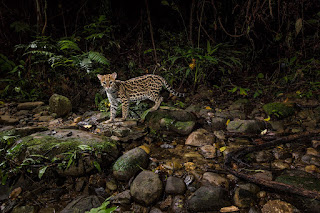National Geographic Live Event: Charlie Hamilton James
 |
| An example of Mr. James' incredible work - Courtesy charliehamiltonjames.com |
Mr. James is a National Geographic photographer. He travels the world and captures amazing images of people, animals, and wildlife, and one of his noted specialties is the underwater photography of freshwater-dwelling animals. However, while his images were simply spectacular, the most interesting part of his presentation for me was his exploration into the people of the Amazon.
 |
| Manu National Park - Courtesy charliehamiltonjames.com |
 |
| Damage to the Amazon by illegal gold mining - Courtesy charliehamiltonjames.com |
Throughout his journey, Mr. James had one recurring conclusion that really stuck with me: the people he met, although constantly villainized, are good people. No person wants to be doing back-breaking work mining for gold using harmful chemicals and not even make a profit. They are forced into these jobs. They do not hate the rainforest. In fact, they were more connected and dependent on it than anyone else.
 |
| People of a tribe Mr. James stayed with in Manu National Park - Courtesy charliehamiltonjames.com |
With this idea, I made a connection to the UN Sustainable Development Goals. To me, the most important aspect of the SDG plan is that each goal cannot be accomplished without the others. I saw the interconnectedness of some major world issues in Mr. James's story. Extreme poverty is causing huge environmental harm, and to address environmental harm, you have to address poverty.
 |
| One of my favorite pictures of the presentation - Courtesy charliehamiltonjames.com |
In the seven or so questions, I was blown away by how many times Mr. James was asked to give a solution to some facet of what he was discussing, and each time he would say, "I don't know." Mr. James's presentation concluded on a purposefully unresolved note. His plan was not successful and he doesn't have all the answers.
I think the reason people kept asking these questions and the subconscious reason behind climate change denial are quite similar. The idea that our current behavior is unsustainable and we could be irreversibly damaging the Earth is frightening. We just want someone to have a plan, a solution, or at least some answers about what we can do to hold on to. If people like Mr. James don't have the answers after all of his hands-on experience, who possibly could?
 |
| How I'm going to feel doing my homework after I finish this blog post! - Courtesy charliehamiltonjames.com |
Thank you to Mr. Caragher for making this possible and for whoever bought our tickets (GIP? Poly?). As I was leaving tonight, I heard so many students saying this was their favorite GIP event ever, and I am so grateful for the opportunity to hear Mr. James speak!
Further exploration:
http://charliehamiltonjames.com/#our-story
The BBC show following his adventures after buying the rainforest: https://www.bbc.co.uk/programmes/b0465vqh/episodes/guide

Fascinating. I passed along to Uncle Frank.
ReplyDeleteElla, what a superb blog entry. For those unfortunate to not hear Mr. James, I will refer them to your write-up. You accurately conveyed what he shared/showed, loved the way you tied in the SDGs, and you go deep on why Mr. James' lack of solutions (Mr. James is being honest about the complexity of the situation and the so many perspectives): "We just want someone to have a plan, a solution, or at least some answers." You are so correct. Thank you for attending and your exemplary write-up of the evening in terms of Mr. James' wonderful and thoughtful presentation and you address the lingering questions of "Where do we go from here?"
ReplyDeleteFascinating blog and an excellent summary of the complexities of the issues at hand.
ReplyDelete